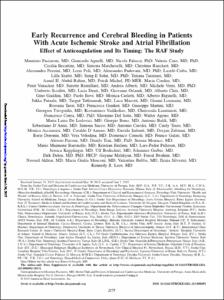Early Recurrence and Cerebral Bleeding in Patients with Acute Ischemic Stroke and Atrial Fibrillation: Effect of Anticoagulation and Its Timing: The RAF Study
- Keimyung Author(s)
- Sohn, Sung Il
- Department
- Dept. of Neurology (신경과학)
- Journal Title
- Stroke.
- Issued Date
- 2015
- Volume
- 46
- Keyword
- Anticoagulant therapy; Atrial fibrillation; Hemorrhagic stroke; Ischemic stroke; Secondary prevention
- Abstract
- Background and Purpose—The best time for administering anticoagulation therapy in acute cardioembolic stroke remains
unclear. This prospective cohort study of patients with acute stroke and atrial fibrillation, evaluated (1) the risk of recurrent
ischemic event and severe bleeding; (2) the risk factors for recurrence and bleeding; and (3) the risks of recurrence and
bleeding associated with anticoagulant therapy and its starting time after the acute stroke.
Methods—The primary outcome of this multicenter study was the composite of stroke, transient ischemic attack, symptomatic
systemic embolism, symptomatic cerebral bleeding and major extracranial bleeding within 90 days from acute stroke.
Results—Of the 1029 patients enrolled, 123 had 128 events (12.6%): 77 (7.6%) ischemic stroke or transient ischemic attack
or systemic embolism, 37 (3.6%) symptomatic cerebral bleeding, and 14 (1.4%) major extracranial bleeding. At 90
days, 50% of the patients were either deceased or disabled (modified Rankin score ≥3), and 10.9% were deceased. High
CHA2DS2-VASc score, high National Institutes of Health Stroke Scale, large ischemic lesion and type of anticoagulant
were predictive factors for primary study outcome. At adjusted Cox regression analysis, initiating anticoagulants 4 to 14
days from stroke onset was associated with a significant reduction in primary study outcome, compared with initiating
treatment before 4 or after 14 days: hazard ratio 0.53 (95% confidence interval 0.30–0.93). About 7% of the patients
treated with oral anticoagulants alone had an outcome event compared with 16.8% and 12.3% of the patients treated with
low molecular weight heparins alone or followed by oral anticoagulants, respectively (P=0.003).
Conclusions—Acute stroke in atrial fibrillation patients is associated with high rates of ischemic recurrence and major
bleeding at 90 days. This study has observed that high CHA2DS2-VASc score, high National Institutes of Health Stroke
Scale, large ischemic lesions, and type of anticoagulant administered each independently led to a greater risk of recurrence
and bleedings. Also, data showed that the best time for initiating anticoagulation treatment for secondary stroke prevention
is 4 to 14 days from stroke onset. Moreover, patients treated with oral anticoagulants alone had better outcomes compared
with patients treated with low molecular weight heparins alone or before oral anticoagulants. (Stroke. 2015;46:2175-
2182. DOI: 10.1161/STROKEAHA.115.008891.)
Key Words: anticoagulant therapy ◼ atrial fibrillation ◼ hemorrhagic stroke
◼ ischemic stroke ◼ secondary prevention
- Keimyung Author(s)(Kor)
- 손성일
- Publisher
- School of Medicine
- Citation
- Maurizio Paciaroni et al. (2015). Early Recurrence and Cerebral Bleeding in Patients with Acute Ischemic Stroke and Atrial Fibrillation: Effect of Anticoagulation and Its Timing: The RAF Study. Stroke., 46, 2175–2182. doi: 10.1161/STROKEAHA.115.008891
- Type
- Article
- ISSN
- 0039-2499
- Appears in Collections:
- 1. School of Medicine (의과대학) > Dept. of Neurology (신경과학)
- 파일 목록
-
-
Download
 oak-2015-0098.pdf
기타 데이터 / 6.1 MB / Adobe PDF
oak-2015-0098.pdf
기타 데이터 / 6.1 MB / Adobe PDF
-
Items in Repository are protected by copyright, with all rights reserved, unless otherwise indicated.